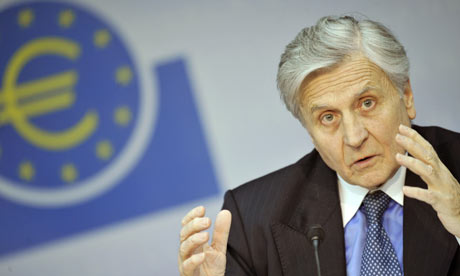Europe needs a "quantum leap" in the way the eurozone economies manage their budgets to allay the markets' fears that the problems in Greece will lead to contagion, the European Central Bank (ECB) president, Jean-Claude Trichet, said over the weekend as he tried to calm fears that the mounting "sovereign debt" crisis could split the monetary union apart.
Trichet also stressed that the recent dramatic decision to allow the ECB to buy up bonds issued by the eurozone's most economically troubled members will not cause inflation, as all additional liquidity injected into the financial system will be withdrawn, and is "totally different" from the quantitative easing that took place in the US and UK after the collapse of Lehman Brothers.
His comments, in an interview with the German magazine Der Spiegel, were seen as an attempt to mollify German critics of the bailout of Greece and defence of Spain and Portugal through a €750bn (£637bn) loan package announced a week ago. As the eurozone's largest economy, Germany will contribute the biggest amount of loans and Germans are furious that while they took steps to improve their competitiveness, they are being called upon to help out other countries – such as Greece – that utterly failed to get to grips with their finances and merely used their membership of the euro to go on a low-interest rate fuelled spending spree.
Last week it emerged that as talks reached fever pitch over the €750bn safety net, Nicolas Sarkozy threatened to pull France out of the euro to force German chancellor Angela Merkel to back the package.
Now the ECB is trying to prove that the stronger eurozone economies are not just writing a blank cheque for their spendthrift neighbours. The €750bn rescue package only bought eurozone countries more time, it didn't resolve the continent's underlying debt problem, according to the ECB's chief economist. Jürgen Stark told the Frankfurter Allgemeine SonntagsZeitung newspaper that the market turmoil will only calm down if the 16 eurozone member states reform their economies and reduce their deficits. "We bought time, not more than that," he said, adding the euro was not in danger "but in a critical situation".
Trichet told Der Spiegel, meanwhile, that Europe's economy "is in its most difficult situation since World War II or perhaps even since World War I".
"There is a need for a quantum leap in the governance of the euro area," he said. "There need to be major improvements to prevent bad behaviour, to ensure effective implementation of the recommendations made by peers and ensure real and effective sanctions in the case of breaches."
Concerns about the stability not just of Greece, but of Portugal, Spain, Italy and Ireland are likely to dominate trading in the financial markets this week. The euro hit a 19-month low at $1.23 in late trading on Friday and economists expect it to continue moving towards parity with the greenback this week.
Spain will this week announce long-awaited reforms to its jobs market, as it tries to reinvigorate its economy, which shrank 3.6% year-on-year in 2009. One in five people in Spain are unemployed, double the eurozone rate and double the number of two years ago. There are 1.3 million households in which not one person has a job and unemployment is 40% among the young. Yet the cost of sacking those with fixed contracts – the bulk of whom are older workers – is among the highest in Europe.The move follows the government's announcement of a package of so-called austerity measures last week which included cuts in civil servant pay and a pension freeze but is likely to prove just as unpopular.
A poll by Spain's El Pais newspaper published over the weekend showed that Spain's conservative opposition has more than doubled its lead over the ruling Socialists since the cuts were revealed. Taken the day after the austerity measures were announced the Demoscopia poll showed the Popular Party (PP) with a 9.1 percentage point advantage over Prime Minister Jose Luis Rodriguez Zapatero's Socialists in the national parliament, versus a 4.2 percentage point lead two weeks ago. Zapatero only has a simple majority in parliament. But the poll also showed that the approval rating for the prime minister, at 3.7 points (of 10) was still a notch above PP leader Mariano Rajoy, who got 3.6 points. A second second survey in the wealthy Catalan region showed that local conservative nationalists Convergencia i Unio (CiU) would defeat the ruling Socialists in an autumn regional ballot.
One of the few optimistic voices belonged to the US treasury secretary, Tim Geithner, who told Bloomberg Television that he was confident Europe would resolve the debt crisis. "Europe has the capacity to manage through this," he said. "And I think they will."
He said Europe was "committed to fix this problem".He said the €750bn package was an "enormously important step" and he didn't think the European turmoil would hurt US growth. "Our economy is getting stronger. We're seeing a lot of confidence," he said.











